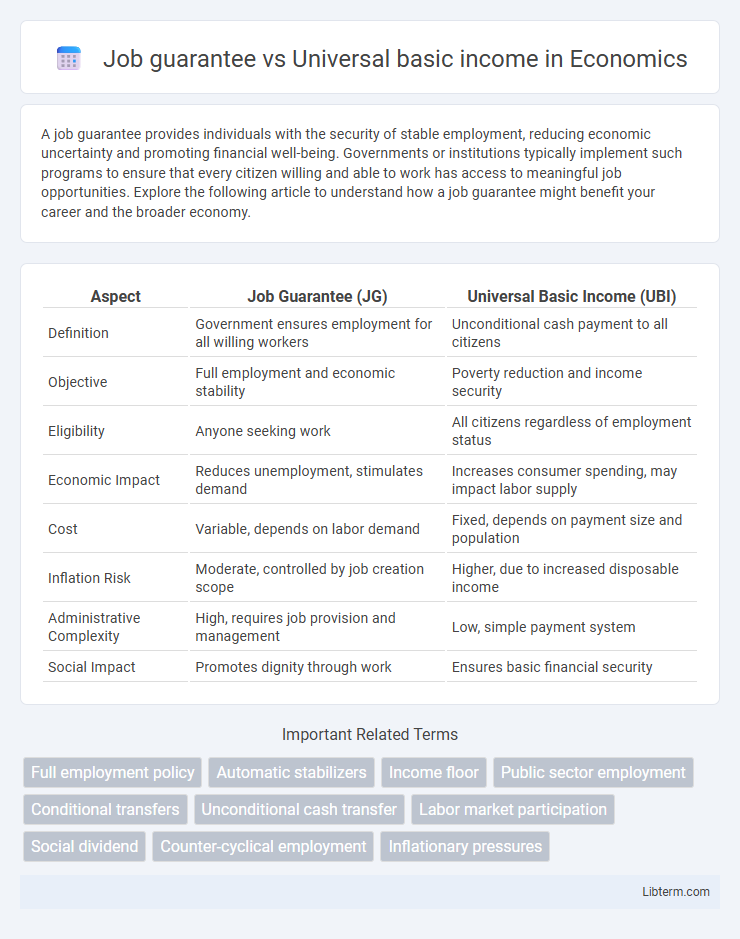A job guarantee provides individuals with the security of stable employment, reducing economic uncertainty and promoting financial well-being. Governments or institutions typically implement such programs to ensure that every citizen willing and able to work has access to meaningful job opportunities. Explore the following article to understand how a job guarantee might benefit your career and the broader economy.
Table of Comparison
| Aspect | Job Guarantee (JG) | Universal Basic Income (UBI) |
|---|---|---|
| Definition | Government ensures employment for all willing workers | Unconditional cash payment to all citizens |
| Objective | Full employment and economic stability | Poverty reduction and income security |
| Eligibility | Anyone seeking work | All citizens regardless of employment status |
| Economic Impact | Reduces unemployment, stimulates demand | Increases consumer spending, may impact labor supply |
| Cost | Variable, depends on labor demand | Fixed, depends on payment size and population |
| Inflation Risk | Moderate, controlled by job creation scope | Higher, due to increased disposable income |
| Administrative Complexity | High, requires job provision and management | Low, simple payment system |
| Social Impact | Promotes dignity through work | Ensures basic financial security |
Introduction to Job Guarantee and Universal Basic Income
Job Guarantee ensures employment for all individuals willing and able to work by providing government-funded jobs, stabilizing the economy, and reducing unemployment. Universal Basic Income delivers a fixed, unconditional cash payment to every citizen regardless of employment status, aiming to alleviate poverty and support financial security. Both policies address economic inequality but differ in implementation and impact on labor markets.
Defining Job Guarantee Programs
Job Guarantee Programs ensure employment opportunities by providing public sector jobs to all individuals willing and able to work, emphasizing full employment and economic stability. These programs aim to address unemployment by creating meaningful work aligned with community needs, thereby enhancing social welfare and reducing poverty. Unlike Universal Basic Income, which offers unconditional cash payments, Job Guarantee Programs focus on active workforce participation and skill development.
Understanding Universal Basic Income
Universal Basic Income (UBI) provides all citizens with a fixed, unconditional cash payment regardless of employment status, aiming to reduce poverty and simplify welfare systems. Unlike Job Guarantee programs that create public sector jobs with specific employment roles, UBI emphasizes individual freedom and financial security without work requirements. Economic studies highlight UBI's potential to stabilize income, promote entrepreneurship, and improve mental health by eliminating income uncertainty.
Economic Impacts: Job Guarantee vs UBI
Job guarantee programs stimulate local economies by directly creating employment opportunities and increasing consumer spending power, which can reduce poverty and inequality while stabilizing inflation through automatic fiscal policy adjustments. Universal Basic Income (UBI) provides unconditional cash transfers that enhance individual financial security and consumption flexibility but may lead to inflationary pressures if not balanced by productivity gains or taxes. Both policies impact labor markets differently: job guarantees maintain workforce engagement and skills, whereas UBI can influence labor supply decisions and entrepreneurial activities.
Social Inclusion and Community Benefits
Job guarantee programs enhance social inclusion by providing meaningful employment, fostering community engagement, and reducing social isolation through collaborative work environments. Universal basic income offers financial security that empowers individuals to participate in community activities and access essential services, promoting inclusivity across diverse populations. Both approaches contribute to stronger social cohesion, but job guarantees directly integrate individuals into the workforce, while universal basic income supports broader economic participation and stability.
Addressing Unemployment and Poverty
Job guarantee programs directly address unemployment by ensuring every individual has access to paid work, fostering economic stability and skill development. Universal basic income provides a fixed financial support to all citizens, reducing poverty by guaranteeing a minimum income regardless of employment status. Both approaches aim to alleviate poverty, but job guarantees focus on active labor participation while UBI emphasizes unconditional financial security.
Critics and Challenges of Each Approach
Critics argue that job guarantee programs may struggle with funding sustainability and bureaucratic inefficiencies, potentially leading to low-quality or mismatched employment opportunities. Universal basic income (UBI) faces challenges such as potential inflationary effects, disincentives to work, and the high fiscal cost of providing unconditional payments to all citizens. Both approaches raise concerns about long-term economic impacts, with job guarantees potentially distorting labor markets and UBI requiring substantial policy shifts to ensure equity and effectiveness.
Policy Implementation and Global Examples
Job guarantee programs require governments to create public sector roles ensuring employment for all willing workers, with successful examples in Argentina's Jefes de Hogar program and India's Mahatma Gandhi National Rural Employment Guarantee Act (MGNREGA). Universal Basic Income (UBI) involves direct cash transfers to all citizens regardless of employment status, as tested in Finland's basic income experiment and pilot programs in Kenya and Canada. Policy implementation of job guarantees often demands extensive administrative capacity and labor market adjustments, while UBI requires robust fiscal resources and effective targeting mechanisms to balance economic incentives and social welfare globally.
Comparative Analysis: Strengths and Weaknesses
Job guarantee programs ensure full employment by providing government-funded work, addressing unemployment and improving skill development but may face challenges in funding and labor market distortions. Universal Basic Income (UBI) offers unconditional cash payments to all citizens, promoting financial security and reducing poverty without stigmatization, though it risks inflation and may disincentivize workforce participation. Evaluating both, job guarantees target employment explicitly with potential economic productivity benefits, while UBI emphasizes income equality and simplicity at the expense of direct job creation.
Future Outlook: Which Path Forward?
Job guarantee programs promise stable employment linked to skill development and economic productivity, potentially reducing poverty and unemployment rates more directly than Universal Basic Income (UBI). UBI offers unconditional financial support that can alleviate poverty and empower individuals to pursue education or entrepreneurship but may face challenges in addressing systemic employment disparities. Future economic models may benefit from hybrid approaches that combine guaranteed work with basic income to balance social security and workforce engagement amid automation and digital transformation.
Job guarantee Infographic

 libterm.com
libterm.com